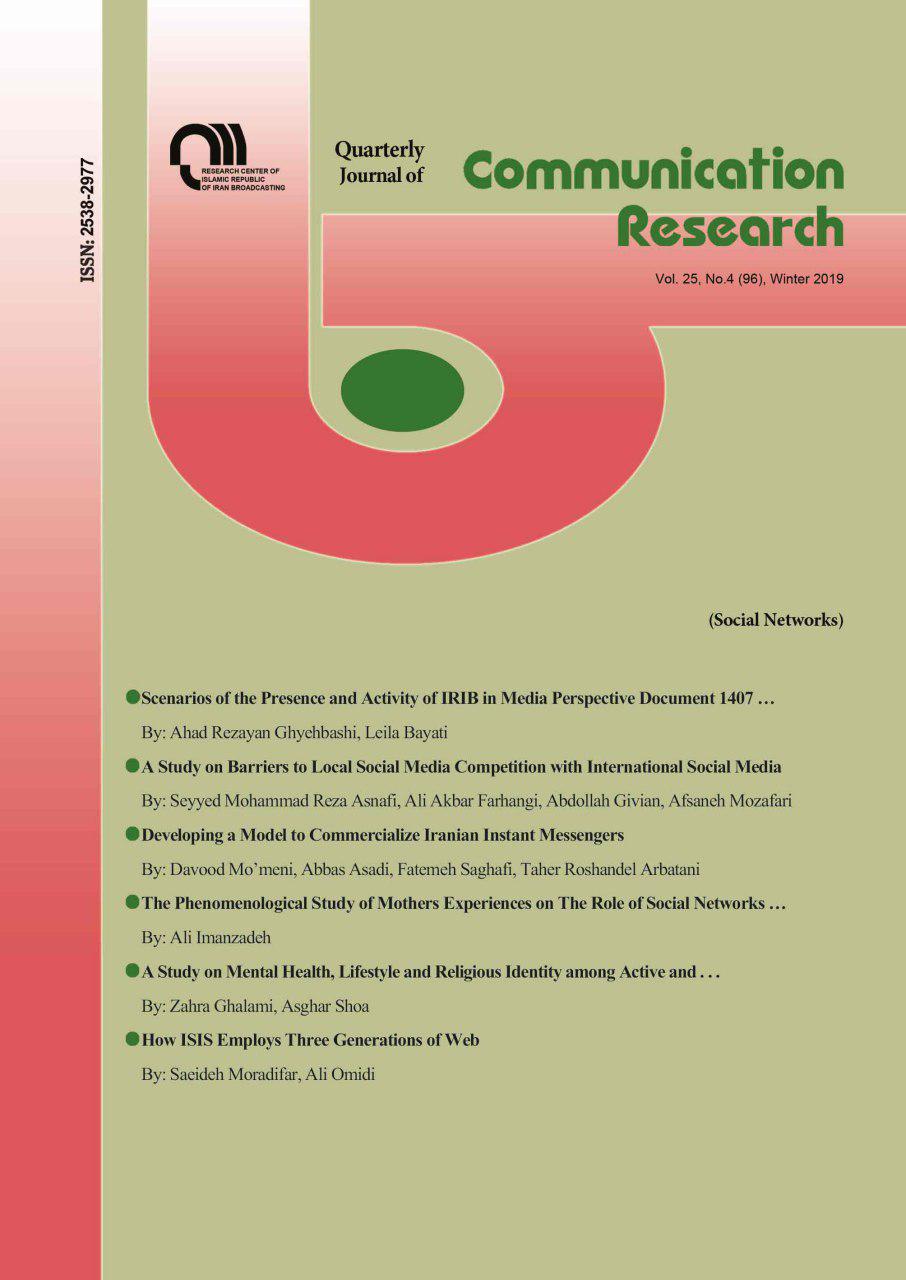Adib Hajbagheri, M.; Parvizi, S. & Salsali, M. (2011). Qualitative Research Methods. Tehran: Nashr Va Tabligh-E Bashari Pub.
Adib, U.; Fathiazar, E.; Kozohouri Pahabad, R. & Rasouli, S. (2015). Student Perceived Experience Of Virtual Social Networking, Opportunities And Threats (A Qualitative Phenomenological Study). National Conference on Psychology And Social Pathology Management. Azad University of Chabahr, Chabahar.
Afzali, M. (2012). The Role And Function Of Virtual Social Networks In Crisis Management. (M.A Thesis). IRIB University.
Borhani, B.; Abbaszadeh, A. & Mohsenpour M. (2012). Illumination Meaning Of Ethical Sensitivity in Nursing Students: A Qualitative Study. Journal of Medical Ethics, 6 (22), 93-115.
Doran, B. (2004). Family Identity and Interaction In Cybernetic Space. Journal of Social Problems of Iran, (44), 89-128.
Ebrahimi, I. (2013). Providing And Fitting An Ethical Sensitivity Model And Its Relationship With Caring Teaching In Kamyaran City. (M.A Thesis). Faculty of Humanity and Social Science, Kurdistan University.
Husserl, E. (2007). Cartesian Meditations: An Introduction To Phenomenology (Rashidian, A. K. Trans.). Tehran: Elmifarhangi Pub. (Original Work Published 1931).
Imanzadeh, A. & Salahshouri, A. (2009). A Look At Analytical And Meta-Analytic Approaches To The Philosophy Of Education. Hamedan: Bu-Ali Sina University.
Imanzadeh, A. (2015). Experiencing the Effects of Social Network Membership on Marital Relation (Married Students Of The University Of Medical Sciences In Tabriz, Phenomenology Study). Journal of Education and Propagation, 4 (7).
Izadi, A. Et Al. (2013). The Relationship between Moral Distress and Retention In Nurses. Journal of Medical Ethics And History Of Medicine, 6 (2), 43-56.
Kafashi, M. (2010). Examining the Internet Impact on Family Values. The Socio-Cultural Council Of Women And Family (Affiliated To Supreme Council of The Cultural Revolution), 11 (3), 57-78.
Kazemi, H. R. (2010). The Negative Effects of Expanding Social Networks on Individuals' Privacy. Journal of Rahavard, 31.
Mahdizadeh, H. (2003). Islamic Teachings on Imitation of Patterns With Emphasis on Adolescence. Journal of Ma’refat, 67.
Memar, S.; Adlipoor, S. & Khaksar, F. (2012). Virtual Social Networks and Identity Crisis (With Emphasis on Identity Crisis In Iran). Journal of Social Studies and Research In Iran, 4, 155-176.
Rahbarghazi, M. R.; Hatami, A. & Abbasi, A. (2018). The Relationship between Virtual Social Networks And The Transformation of Collective Identities. Journal of Majlis & Rahbord, 25 (95), 33-58.
Sadeghian, E. (2005). Impact of Computers and the Internet on Children And Adolescents. Electronic Journal Of Iranian Research Institute For Information Science And Technology (Irandoc), 4 (4), 78-86.
Salehi, A. & Baradaran, M. (2016). The Study of Phenomenological Damages Internet on the Young People's Religious. Journal of Akhlagh, 2 (21), 11-25.
Sokolowski, R. (2005). Introduction To Phenomenology (Ghorbani, M. R. Trans.). Tehran: Gam Pub.
Soleymanipour, R. A. (2017). Social Networks; Opportunities and Threats. Journal of Rahavard-E No, 31.
The Main Challenges of Religious Education In The Rhizomatic Space. Journal of Psychology And Educational Sciences, 3 (4), 1-18.
Zolfalifam, J.; Farasatkhah, M. Maleki, A. & Zahedi Mazandarani, M. J. (2018). Phenomenology Of Social Ethics For Virtual Social Networks Users (Case: Graduate Students Born In The 1980s). Journal of Communication Research, 25 (94), 155-185.

